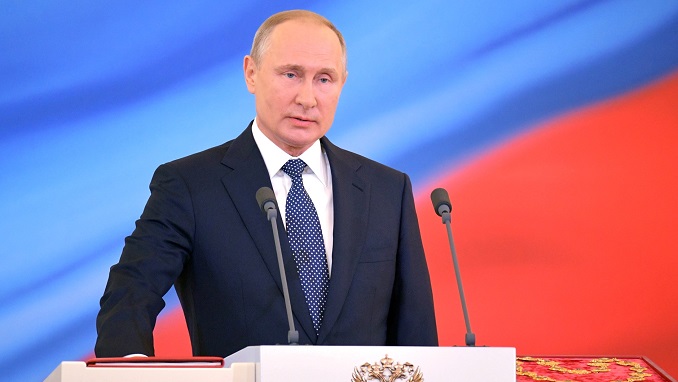Russian President Vladimir Putin has signed a bill that stipulates hefty fines for not complying with the law on the Internet and for violating the rights of Russian citizens on the Internet, including censorship of Russian media. The document was published on the official portal of legal information on Wednesday, TASS reported.
The bill introduces changes to Russia’s Code of Administrative Offenses.
In particular, ignoring of warnings about violation of the rights of Russians by the owners of websites and other resources will entail the imposition of an administrative fine on citizens in the amount of 50,000 rubles ($679) to 100,000 rubles ($1,358), on officials – from 200,000 rubles ($2,717) to 400,000 rubles ($5,435), on legal entities – from 600,000 rubles ($8,154) up to 1 mln rubles ($13,591).
A repeated refusal to comply with the requirements of the authorities will entail a multiple increase in fines. In particular, in this case, citizens will have to pay a fine in the amount of 200,000 rubles ($2,718) to 300,000 rubles ($4,077), officials – from 500,000 rubles ($6,795) to 700,000 rubles ($9,513), legal entities – from 1.5 mln rubles ($20,386) to 3 mln rubles ($40,772).
The document introduces sanctions for violation of a previously adopted law, which gave Russian media watchdog Roskomnadzor the right to block or slow down the traffic of Internet resources that discriminate against the Russian media.
The Prosecutor General and his deputies, in agreement with the Russian Foreign Ministry, will be able to assign this status to the owner of an information resource that allows such discrimination. After assigning this status, a corresponding warning is issued to the offender. The document covers the largest Internet resources – YouTube, Facebook and Twitter.
The law also determines that violating the procedure for installation, operation and upgrade of “technical means to counter threats to the stability, security and integrity of functioning” of the Internet and public communication networks in Russia entails an administrative fine for officials in the amount of 15,000 rubles ($203) or more up to 30,000 rubles ($407), for individual entrepreneurs – from 30,000 rubles ($407) to 50,000 rubles ($679), and for legal entities – from 300,000 ($4,076) to 500,000 rubles ($6,794).
For a repeated violation within a year, the fine for officials can be raised up to 50,000 rubles ($679), for individual entrepreneurs – up to 100,000 rubles ($1,358), and for legal entities – up to 1 mln rubles ($13,591).
The refusal of a telecom operator to establish or apply the technical means of control laid down by law for compliance with the requirements of legislation on restricting access to information entails the imposition of a fine on citizens in the amount of 2,000 rubles ($27) to 5,000 rubles ($68), on officials – from 10,000 rubles ($136) to 20,000 rubles ($271), for individual entrepreneurs – from 30,000 rubles ($407) to 50,000 rubles ($679), for legal entities – from 300,000 ($4,076) to 500,000 rubles ($6,794).
A repeated failure to comply with requirements during the year will entail fines up to 1 mln rubles ($13,591).
If the owner or other owner of the technological communication network does not comply with the requirements of the agencies authorized to conduct operational investigative activities or ensure the security of the Russian Federation, and does not take measures that block the “disclosure of organizational and tactical methods” of such agencies, then this person will face administrative liability. In this case, the fine for citizens will be from 3,000 rubles ($41) to 5,000 rubles ($68), for officials -30,000 rubles ($407) to 50,000 rubles ($679), for legal entities – from 300,000 ($4,076) to 500,000 rubles ($6,794). If the violation is repeated, the fines will be significantly increased. For citizens – up to 30,000 rubles ($407), for officials – up to 500,000 rubles ($6,794), for legal entities – up to 6 mln rubles ($81,545).












